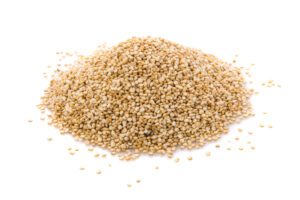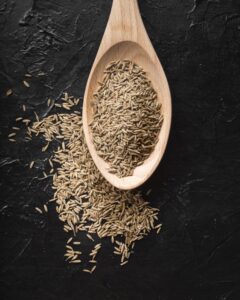health benefits of sesame seeds :- Uncover the wonders of sesame seeds! Celebrated in Ayurveda for their amazing health perks, these tiny seeds are loaded with essential minerals. They’re not just tasty – sesame seeds support skin health and help manage blood sugar levels. In this blog, you’ll learn about the extensive health benefits of sesame seeds, their nutritional value, and simple ways to add more to your daily diet. Dive in and explore the world of sesame seeds for a healthier you! Keep reading to discover all their secrets!

Health benefits of sesame seeds:-
Discover the health benefits of sesame seeds:
- Stronger Bones: Sesame seeds are rich in calcium, supporting bone strength. They also contain zinc, which helps fortify bone structure.
- Blood Sugar Control: Ideal for diabetic individuals, sesame seeds help regulate blood sugar levels. They serve as a natural blood sugar regulator with low carbs but high healthy fats and protein. Pinoresinol, a lignan in sesame seeds, is key in managing blood sugar.
- Balanced Blood Pressure: Sesame seeds, rich in magnesium, help prevent high blood pressure and hypertension. They contain essential antioxidants like vitamin E and lignans, which curb plaque buildup in arteries, maintaining steady blood pressure.
- Soothes Arthritis and Breathing Issues: Packed with vital minerals like magnesium, copper, and calcium, sesame seeds offer relief. Copper alleviates rheumatoid arthritis discomfort, while magnesium eases respiratory problems.
- Nurtures Hair and Skin: Sesame seeds are packed with vitamin B complexes—niacin, thiamine, folic acid, riboflavin, and pyridoxine—vital for healthy hair and skin. Including these seeds in your diet or using sesame oil for weekly scalp and body massages can notably enhance hair and skin health
- Thyroid Health Boost: The thyroid, rich in selenium, relies on this mineral for hormone production. Sesame seeds, whether hulled or unhulled, provide about 18% of the recommended selenium intake, aiding thyroid function. Additionally, their vitamin B6, copper, zinc, and iron content supports healthy thyroid hormone production.
7. Immune System Support: Packed with zinc, sesame seeds strengthen the immune system by fostering T-lymphocyte development, crucial for fighting off microbes and bolstering immunity.
8. Mental Well-being Aid: Sesame seed oil contains tyrosine and amino acids that influence serotonin, impacting mood. Regular sesame oil consumption can balance serotonin levels, reducing the risk of anxiety and supporting overall mental health.
9. Constipation Relief: Rich in unsaturated fatty acids and fiber, black sesame seeds promote regular bowel movements, aiding in relieving constipation.
10. Anti-inflammatory and Antioxidant Properties: Sesame seed oils, containing sesaminol and sesamol, combat cell damage caused by free radicals and possess anti-inflammatory properties. They offer relief from joint inflammation, scrapes, and toothaches.
where do sesame seeds come from:-
Sesame seeds, those small yet nutritious powerhouses, have an interesting story behind their origin. They grow from the sesame plant, known scientifically as Sesamum indicum, which calls tropical regions home. These seeds have a history that spans thousands of years, initially hailing from Africa and India.
Ancient societies highly valued sesame seeds for their oil, food uses, and medicinal properties. They’re a crucial part of traditional cooking in Asia, the Middle East, and Africa, featured in various dishes and spreads.
Sesame plants need warm weather, good drainage, and lots of sunlight to thrive. The seeds are found in pods that burst open when they’re ready. After being hand-harvested, the seeds are dried and either hulled or left unhulled, depending on their intended use.
Today, sesame seeds are grown in many places worldwide, like Asia, Africa, South America, and parts of the United States. People love them for their nutty taste and because they’re packed with good stuff like protein, healthy fats, vitamins, and minerals. They’re not just for eating – sesame seeds are also pressed for their oil, and used in cooking, skincare, and traditional medicine.
Learning about where sesame seeds come from helps us understand their importance in different cultures and how they’re good for us. From their ancient beginnings to their popularity today, these little seeds play a big role in cooking and keeping us healthy.”

Eating a lot of sesame seeds can cause:
Low Blood Pressure and Sugar: If you have diabetes or heart issues and eat too many sesame seeds, it might affect your medications, making your levels drop too much.
Trouble with Your Appendix: Overeating sesame seed fiber might make your belly feel uncomfortable and bloated. It could even lead to a problem with your appendix.
Allergy Risk: Some people might feel sick or have trouble breathing after eating sesame seeds. If this happens, talk to a doctor.
Possibility of Gaining Weight: Eating too many sesame seeds might make you gain weight. The extra fiber can sit in your stomach without being digested.

Who Should Avoid Eating Sesame Seeds?:-
It’s better to steer clear of sesame seeds if:
- You’re gearing up for surgery
- You have allergies
- You’re expecting a baby or breastfeeding
- You’re managing diabetes or heart issues
- You cope with gout or Wilson’s disease
Sesame seeds are good, but too many might not be. Stick to the recommended daily amount. If you’re unsure about your health, it’s wise to talk to your doctor before adding sesame seeds to your meals.
FAQ:-
Q1:- How to eat sesame seeds?
Ans:- You can enjoy raw sesame seeds as a yummy snack, whether they’re hulled or unhulled. Try toasting or baking them for even more flavor.
Q2:- How many Sesame seeds should take in a day?
Ans:- Have a tablespoon of raw or roasted sesame seeds every day. You can also sprinkle sesame seeds on salads for more taste.
Also read about Guduchi:- Top 11 Guduchi benefits, Guduchi Powder, Guduchi uses, Side Effects of Using Guduchi
